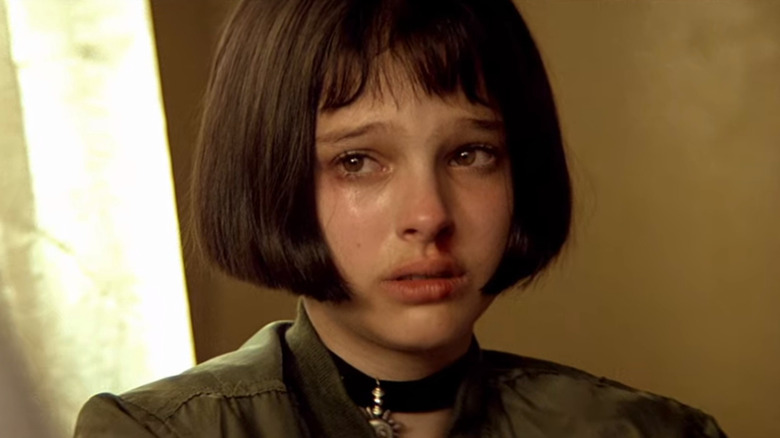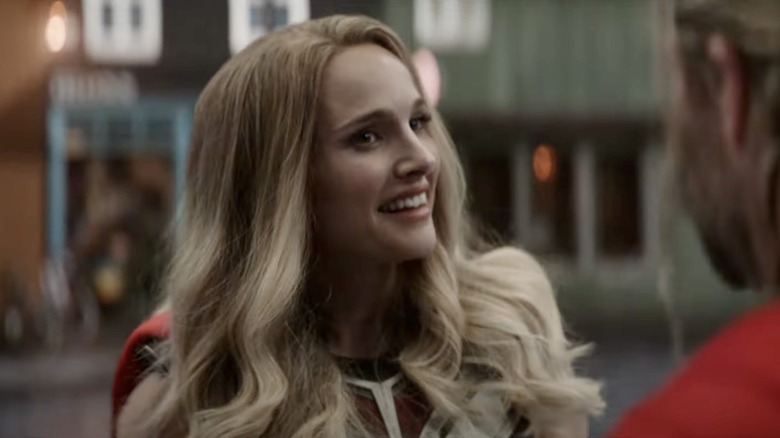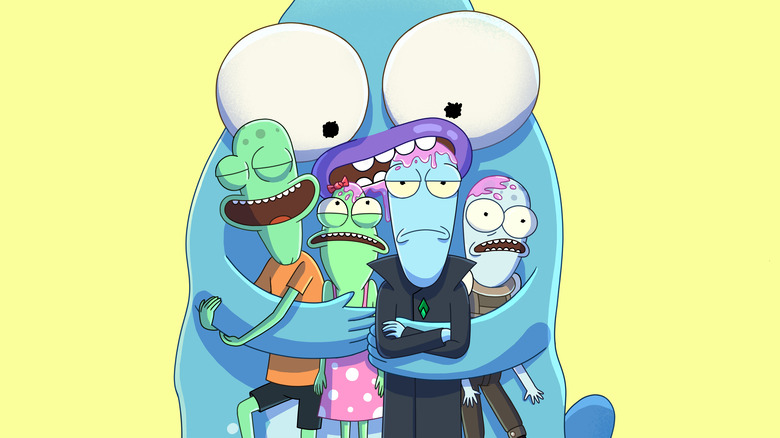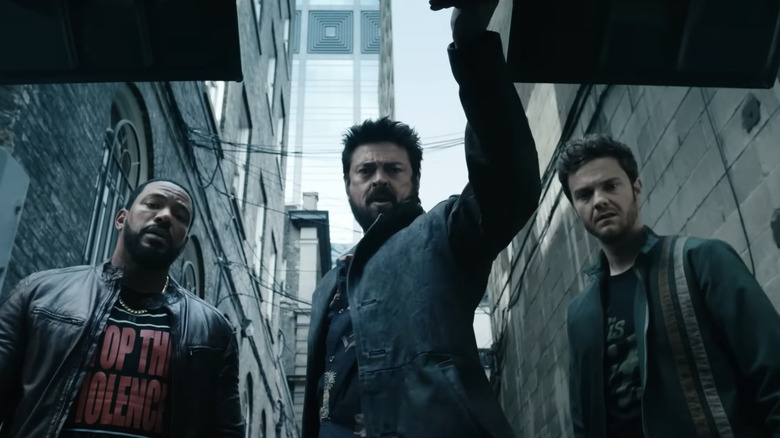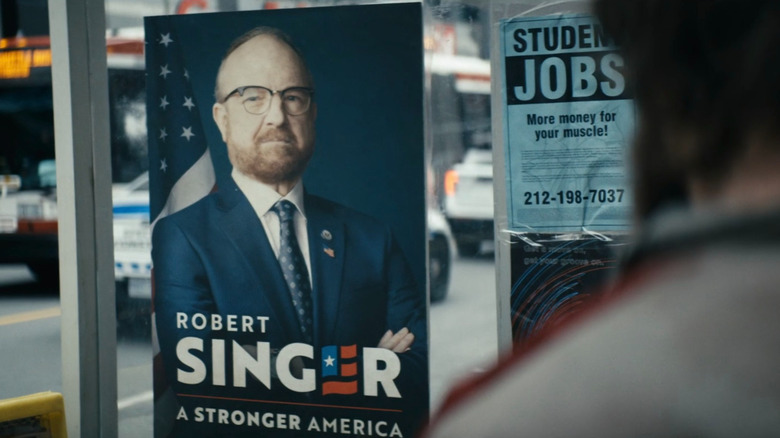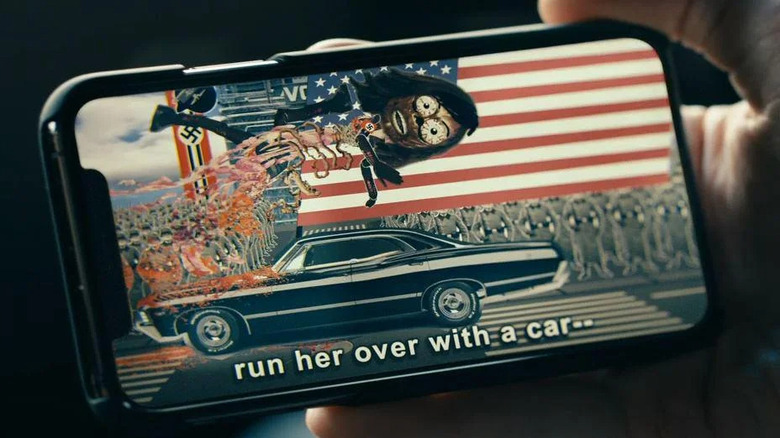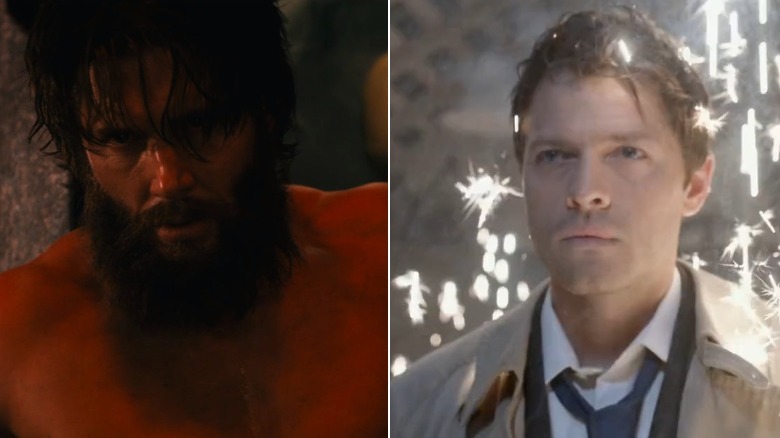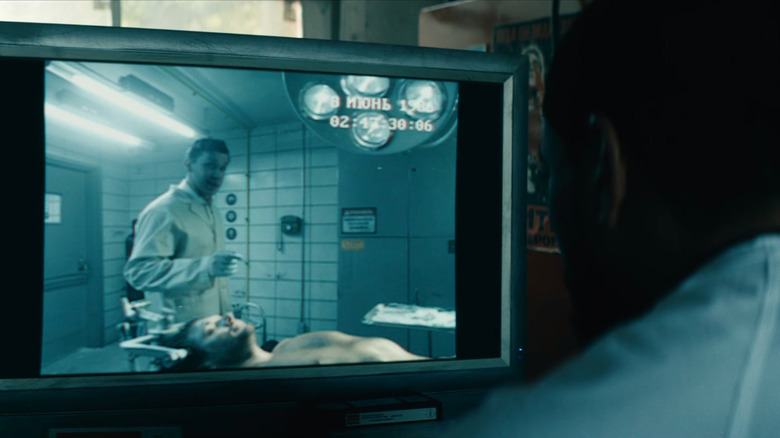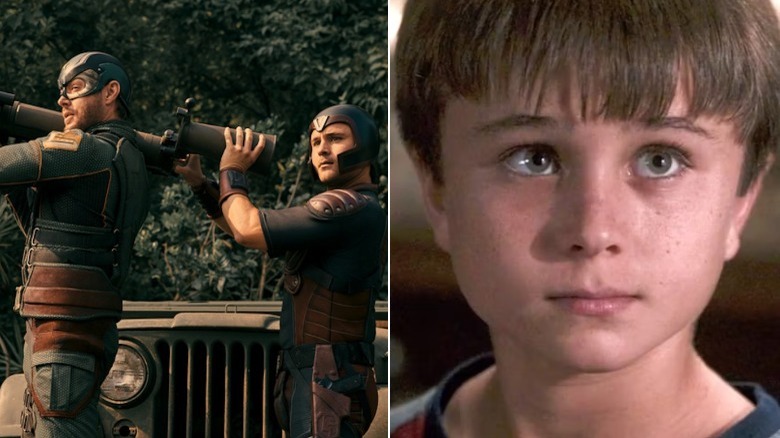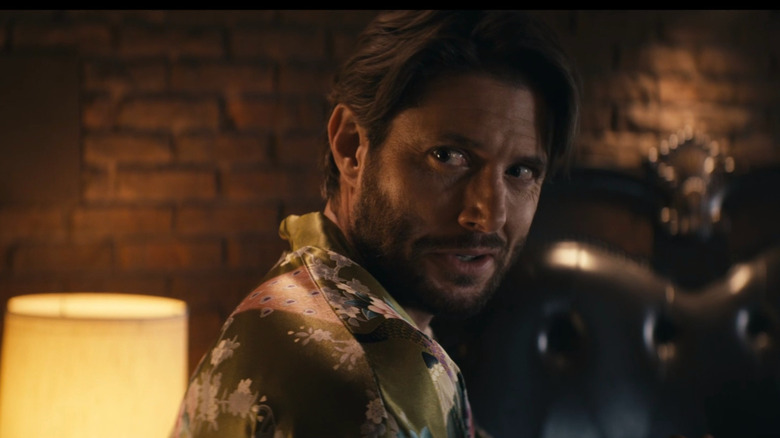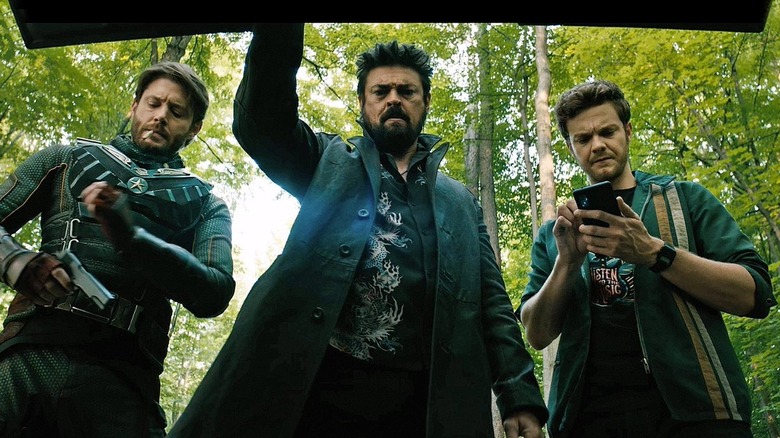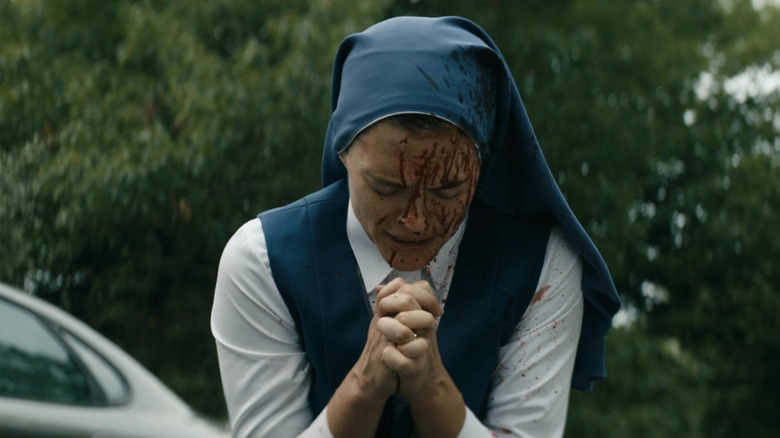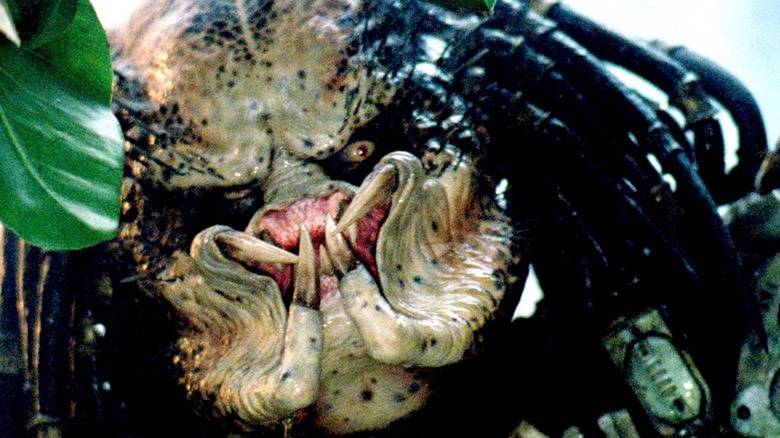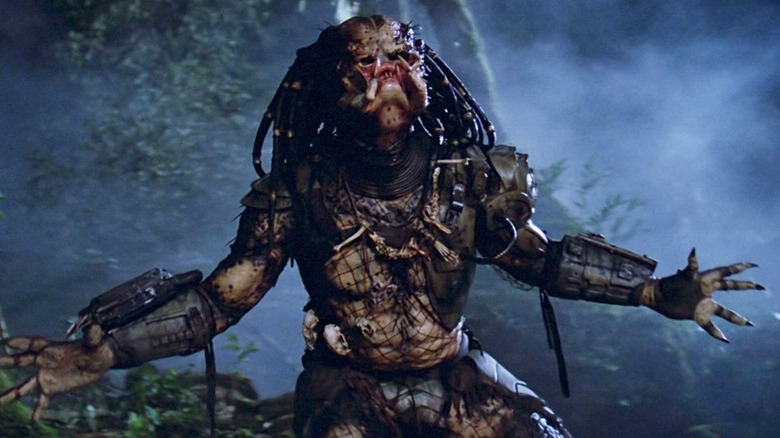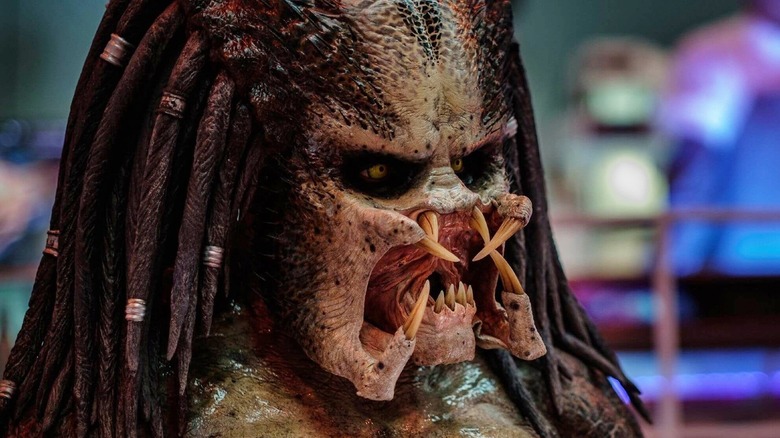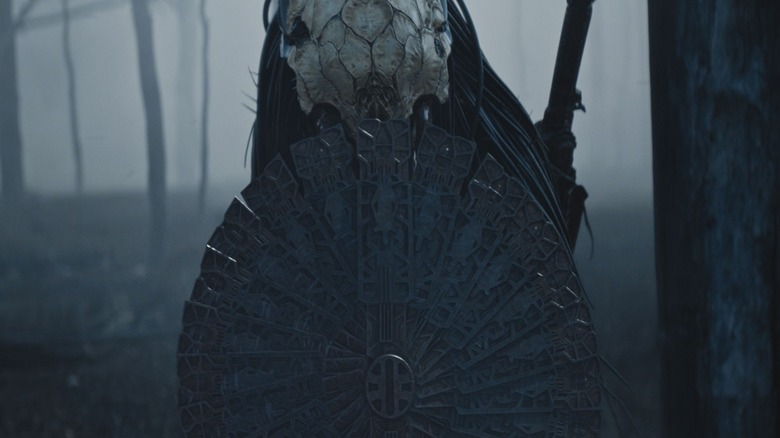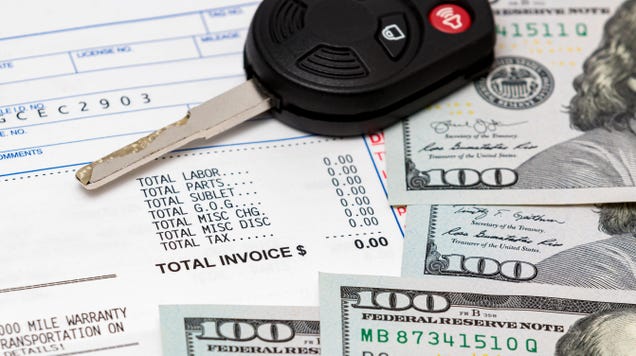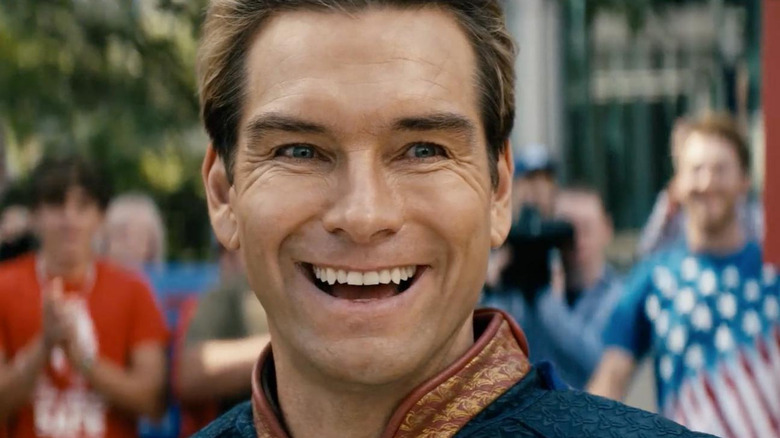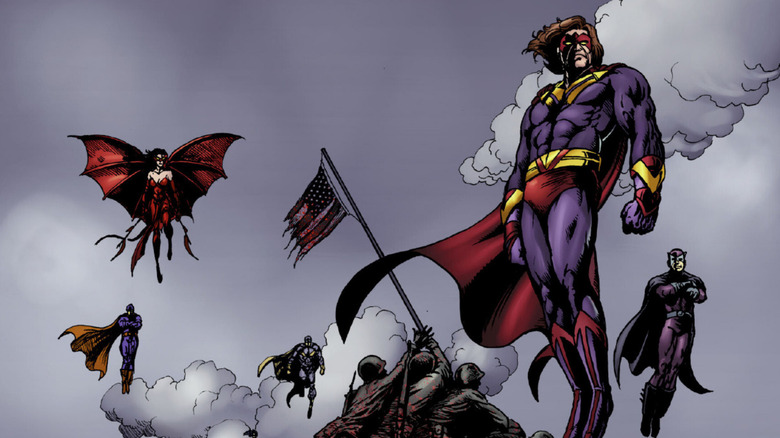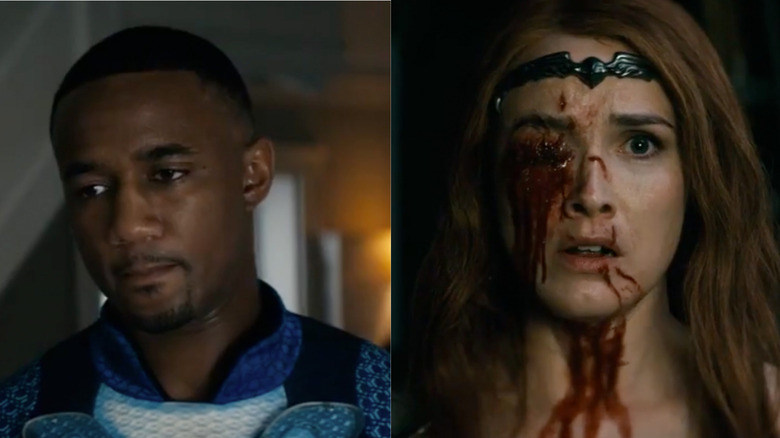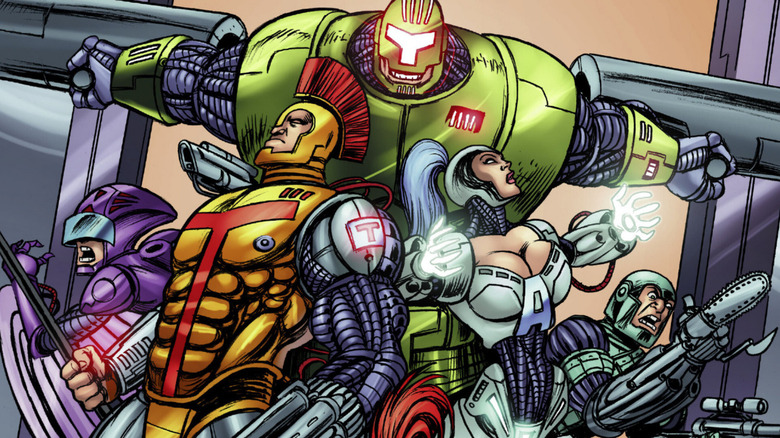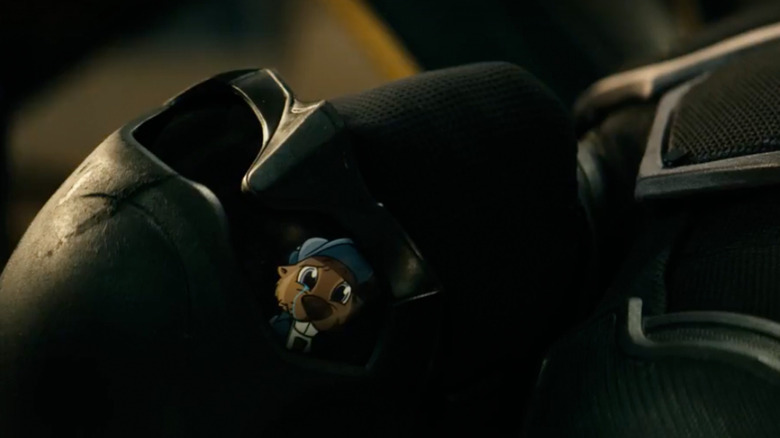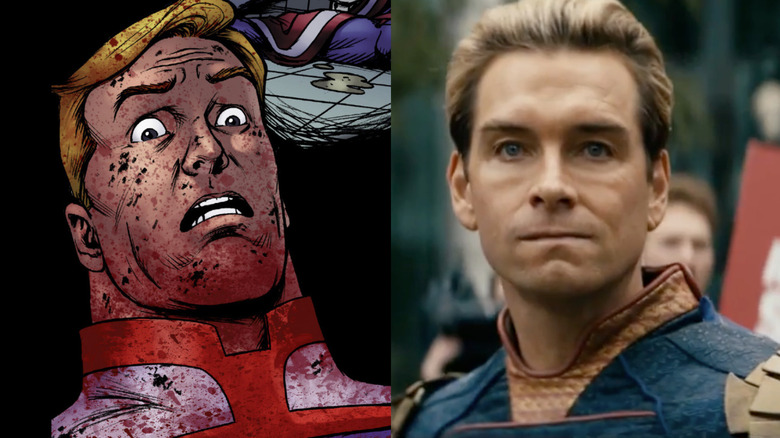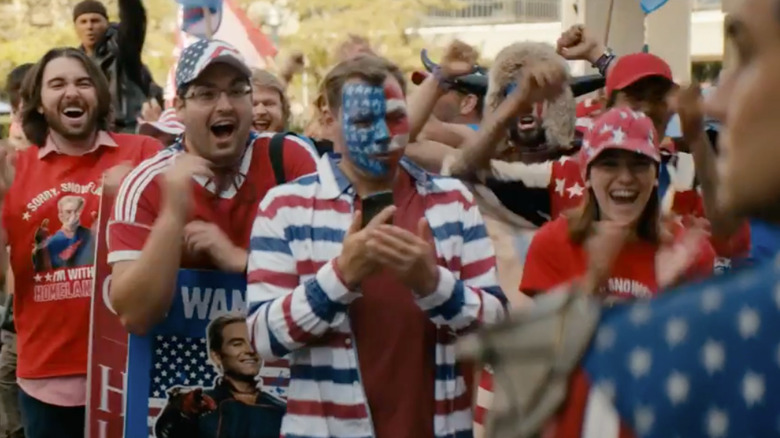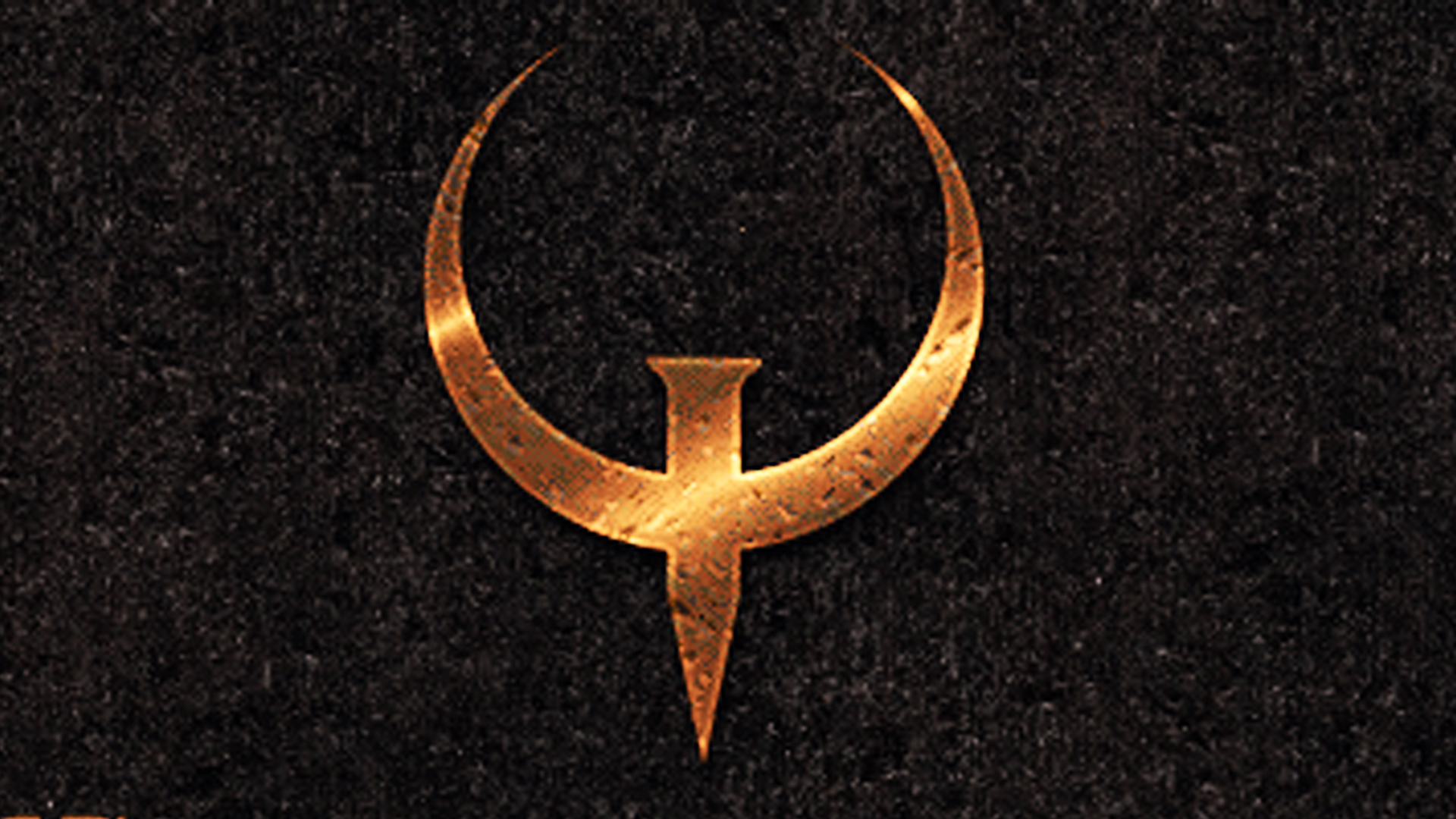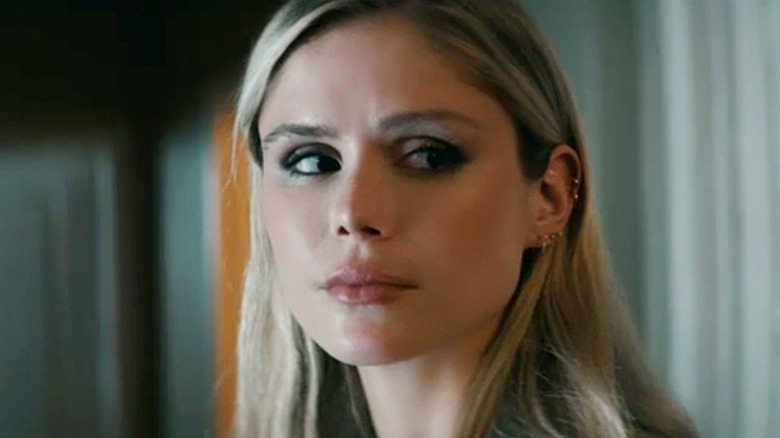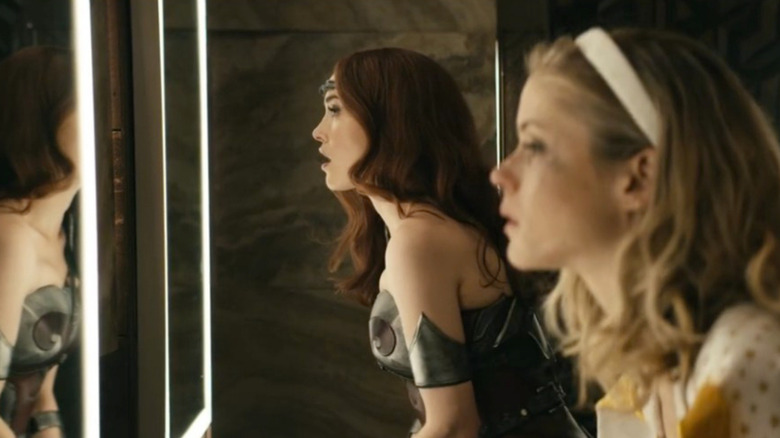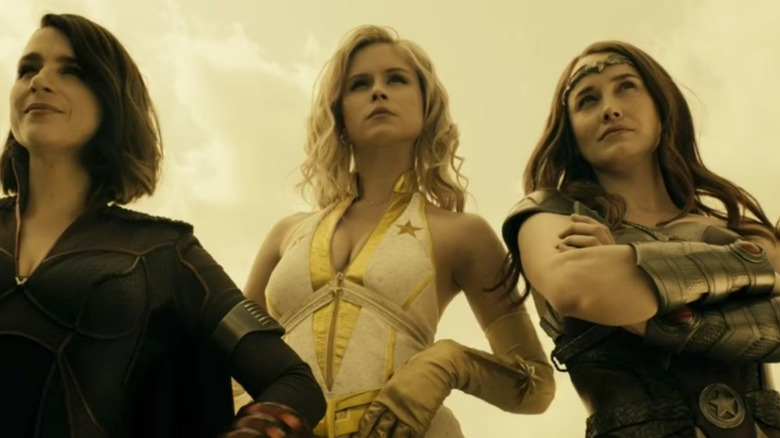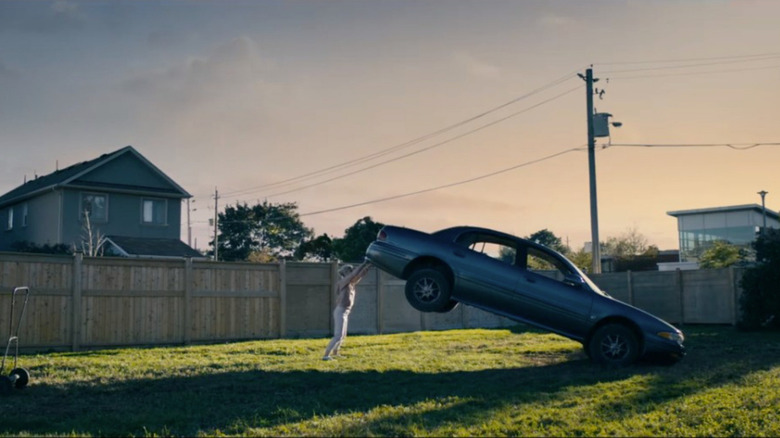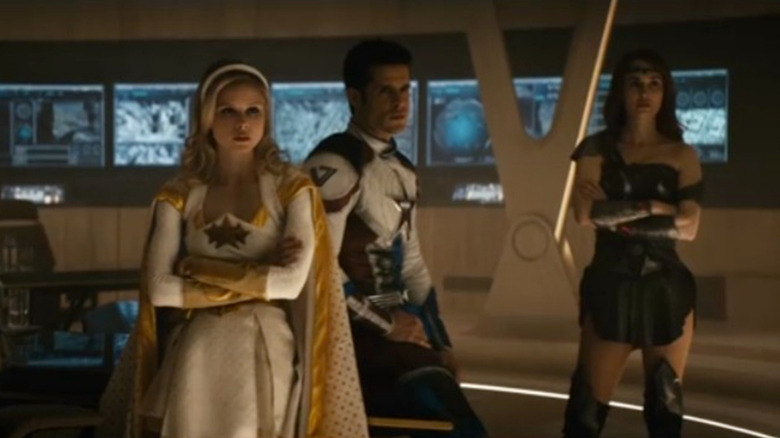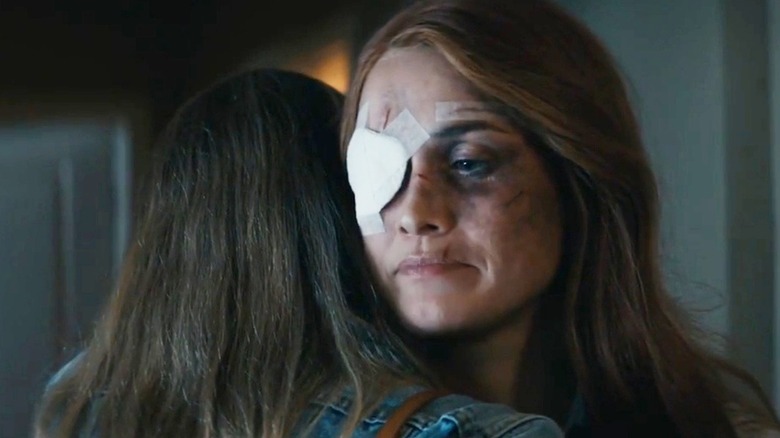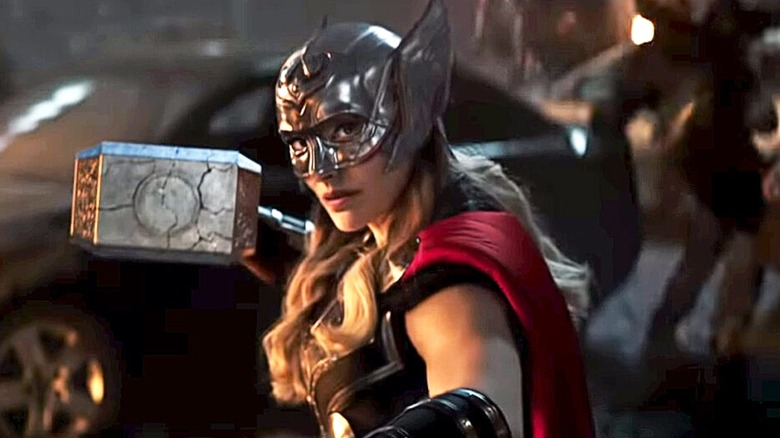
Warning: This article contains major plot spoilers for "Thor: Love and Thunder."
Taika Waititi's "Thor: Love and Thunder" has the honor of bringing Jason Aaron's beloved Mighty Thor into the Marvel Cinematic Universe. While Waititi pulls some story beats and characters from Aaron's decade-long run, which shapes Dr. Jane Foster (Natalie Portman) into the Goddess of Thunder, a Valkyrie, and then into a unique mixture of both, the latest Thor film doesn't wholly embrace its source material. Jane Foster is never telepathically summoned to the moon by Mjolnir. Thor hasn't lost his god status. Earth doesn't have a Frost Giant invasion, and most importantly, Jane's All-Weapon never once graces the screen — a moment that surely would have upped the film's already hilarious depiction of jealous weaponry.
Co-writers Waititi and Jennifer Kaytin Robinson didn't need to recreate an existing comic. That would be boring. However, they dial up the comedy so loud that they miss out on repurposing the thoughtful conversations that Aaron's work is known for (and that Waititi excels at in films like "Hunt for the Wilderpeople"), which could have made "Thor: Love and Thunder" have more heart. "Thor: Love and Thunder" jumpstarts into zany territory that is befitting of the arrogant, dramatic, and colorful cosmos of the gods. However, its breakneck pace, back-to-back battles, and electric visual gags, while delightful, sacrifice character development.
Still, "Thor: Love and Thunder" flaunts some impressive moments that'll make viewers wonder what else wound up on Marvel Studios' cutting room floor.
Best: King Valkyrie's Old Spice Commercial In New Asgard
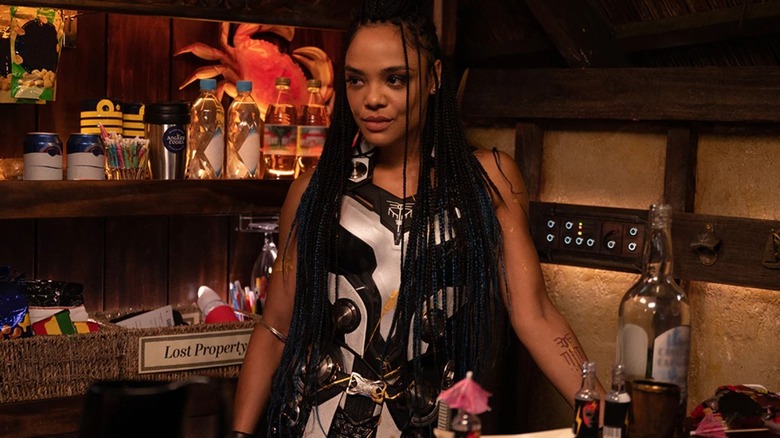
One thing Taika Waititi can do better than any other filmmaker is composing a tight montage that simultaneously catches audiences up on a character's past and present while also delivering comedic digs you never saw coming. Case in point: Valkyrie's Old Spice commercial.
Zoom in on Tessa Thompson's King Valkyrie, outfitted in a divine black suit and surrounded by press. In a voice-over, Korg (Taika Waititi) recounts King Valkyrie's time spent rebuilding New Asgard. As King Valkyrie poses for the camera, we learn that she's turned their fledging kingdom into a tourist destination by participating in commercials for things like deodorant. I did not know how much I needed this scene to exist. From King Valkyrie's thriving and suggestive smile to the joys of the film cheekily shrugging away gender conventions, the bit soars.
Days before "Thor: Love and Thunder" was released in theaters, Luke Hemsworth reprised his role as "actor Thor" from "Thor: Ragnarok" to star in an Old Spice ad, too. It's a sly bit of marketing that foreshadows the gloriousness of Thompson's scene. One can only hope King Valkyrie's version hits the internet soon and breaks it as only an Asgardian can.
Worst: Valkyrie Is Benched During Final Gorr Showdown
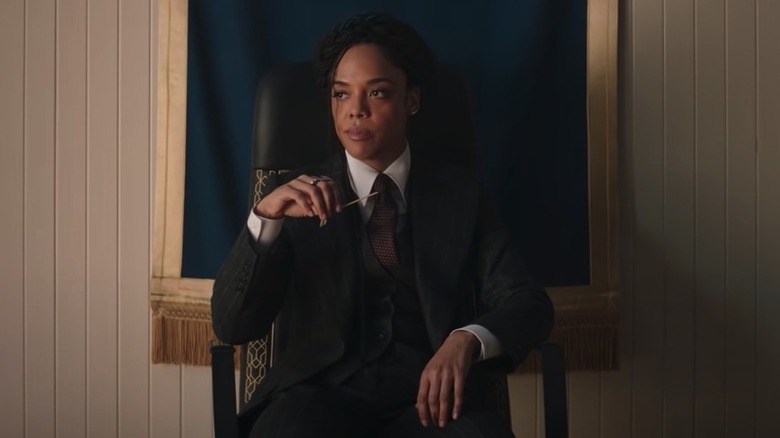
As a huge fan of Marvel Comics' "The Mighty Valkyries," I went into "Thor: Love and Thunder" psyched to see Valkyrie and Mighty Thor fight side-by-side for hours. True, they do team up to avenge New Asgard and save the kingdom's children from Gorr (Christian Bale) — but not for long.
In the comics, Rūna, a character inspired by Tessa Thompson's Valkyrie, is Jane's partner, as they're the only two remaining Valkyries in the cosmos. While the Mighty Thor might wield Mjolnir, she's still new to the trickiness of superpowers and combat strategy. Rūna guides her through this journey as Jane helps the millennia-old Asgardian learn to trust others again.
When "Thor: Love and Thunder" benched Valkyrie from the showdown against Gorr, I wanted to riot. Not only did the story keep Jane and Valkyrie's friendship at surface level, but it also robbed the warrior goddess of the chance to defend her kingdom. The only forgiving aspect of this plotline is how lackadaisically cool Valkyrie is about it. She casually suggests that she might have lost a kidney in their last face-off with Gorr — with a shrug that makes you wonder how many other organs the badass Asgardian has left on the battlefield.
Best: Matt Damon Returns As Loki
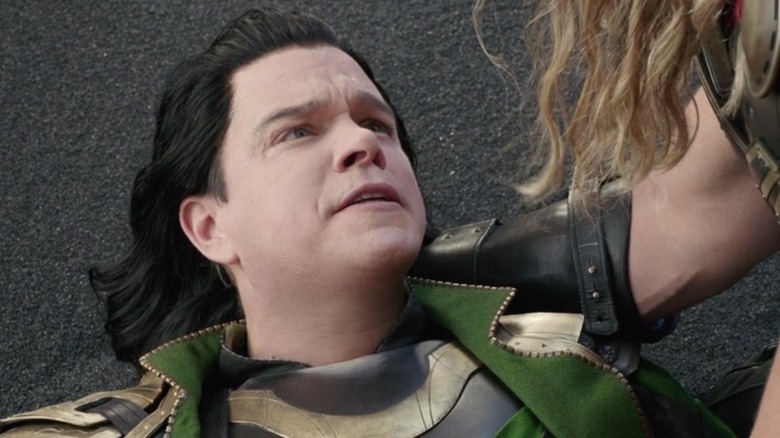
Let's face it. The pandemic has turned most of our brains to mush. Despite Matt Damon confirming in July 2021 that he would reprise his role as actor Loki in "Thor: Love and Thunder," I and the entire movie theater I was in (apparently) forgot all about that. When Damon shook his flowing locks on stage, the room gasped. Watching Damon delve into the role of a self-serious Asgardian theatrical star is such a tease, as you always wished he got one or two more silly lines that poke some lighthearted fun at the MCU. Damon has a knack for comic timing, especially in oddball comedies. Watching him play up a haughty stage actor trope made me nostalgic for his "Dogma" days with Kevin Smith.
In this MCU film, actor Loki reenacts Odin's death in "Thor: Ragnarok," but the best part comes later. Following Gorr's attack on New Asgard and kidnapping all of the kingdom's children, Damon approaches King Valkyrie. He asks if now is the right time to create a play based on the film's current events. While we don't see it play out in this MCU film, if the past two Thor films are any evidence, I'm willing to bet Damon's Asgardian actor will return, bringing dramaturgical flair to Gorr's attack on New Asgard. Plus, his character exits with a perfectly delivered quip: "Well, I didn't hear a no..."
Worst: Guardians Of The Galaxy's Exit
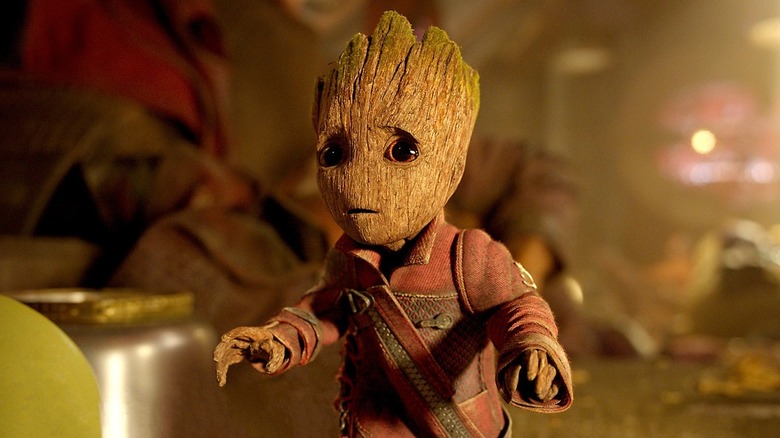
When "Thor: Love and Thunder" begins, the Asgardian warrior god (Chris Hemsworth) lives aboard the Benatar, traveling from quadrant to quadrant to fight for justice alongside the Guardians of the Galaxy. Of course, Taika Waititi's incarnation of Thor is more concerned with the rock n' roll theatrics of dramatically saving the day (that includes doing a split between two warring spaceships) than necessarily fighting for a specific cause.
Early on, Peter Quill (Chris Pratt) calls out the God of Thunder for seeming lost. In Thor's defense, the past 28 Marvel Cinematic Universe films have taken a lot from him: his father, mother, sister, Mjolnir (technically, smashed to bits), and his home planet died, not to mention seeing his brother Loki die multiple times after they repaired their bond. Yikes!
When the Guardians of the Galaxy learn of Gorr's attacks throughout the cosmos, they tell Thor that New Asgard is in trouble. The group then parts ways with Thor. While it makes narrative sense that they'd trust Thor to save New Asgard, this choice rings hollow emotionally. The Guardians quickly abandon Thor (and his space-goats) instead of offering help. The group could have given Thor something — resources, intel, or a fancy Rocket Raccoon-made weapon — to give purpose to their appearance. The script could have doubled down on Quill's frustration with Thor's selfishness, dosing him with a much-needed reality check. Instead, their presence and exit seem like an extended (and underutilized) cameo solely meant for laughs.
Best: Jane's Unique Way Of Wielding Mjolnir
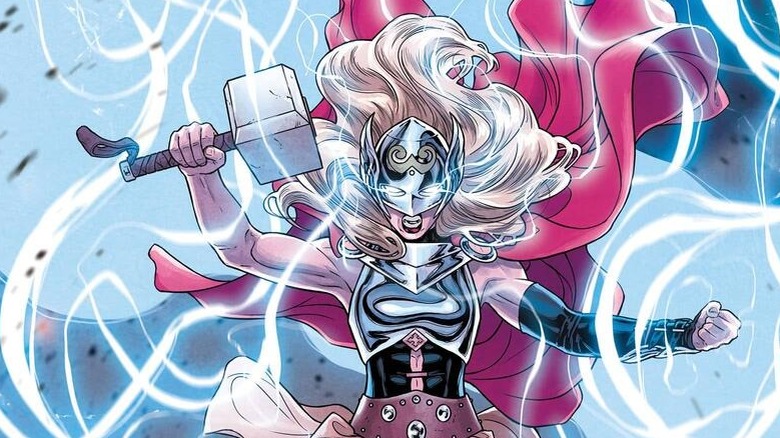
Unlike her comics counterpart, Natalie Portman's Jane Foster wastes no time wondering when to reveal her identity to her ex-boyfriend in "Thor: Love and Thunder." Taika Waititi and Jennifer Kaytin Robinson's script embraces a streamlined story, foregoing intrigue to instead focus on how Thor reacts to Jane's heroic transformation while battling cancer. Unfortunately, unmasking and confessing her terminal diagnosis so quickly to Thor undercuts the emotional weight of both. After all, the two haven't spoken in eight years, so it's questionable that Dr. Jane Foster would trust the God of Thunder again so easily and without conflict, especially after revealing that Thor's on-call Avenger duties interfered with their relationship.
However, the co-writers admirably find an inventive way to bring the Mighty Thor's powers to life on-screen. In the panels of "The Mighty Thor" comics, Thor speaks about how Jane wielded his hammer in a way he never could. On-screen, the Mighty Thor has the unique ability to break Mjolnir apart, sending shards out into nearby enemies like magic arrows that then boomerang back together to reform the mythic hammer. Even in Thor's hands, he's unable to accomplish the same feat. I loved this choice as it not only nods to Jane's quick mastery of the Asgardian weapon but gives her a memorable and visually unique fighting style.
Worst: Sif Does Nothing But Lose An Arm
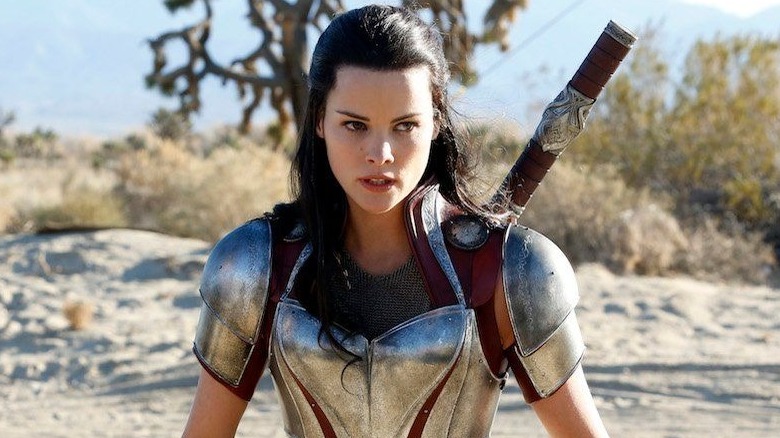
In May 2022, Marvel Studios confirmed Jaimie Alexander's return as Sif in "Thor: Love and Thunder" when her name appeared on the Marvel Cinematic Universe movie's official poster. After not appearing in the MCU films since "Thor: The Dark World," likely due to scheduling conflicts from Alexander's commitment to NBC's "Blindspot" for five seasons, fans were excited to see what cosmic adventures awaited the Goddess of War and Dueling. Sadly, Lady Sif doesn't see much time on the battlefield in "Thor: Love and Thunder."
Lady Sif's role in the fourth "Thor" film amounts to little more than a plot device. Sif sends an alert to the Guardians of the Galaxy and Thor, informing them that Gorr is heading to destroy New Asgard. When Thor finds her, she's nearly dead, missing an arm, and defeated. Another warrior could have been in her place and the story wouldn't have changed. Thor then sends her to New Asgard, where she and Valkyrie team up to train their kingdom's next generation of Asgardian warriors, but even that role is suggested rather than shown.
Sif was created by the legendary Stan Lee and Jack Kirby, so it's a huge disappointment that one of Asgard's greatest warriors never fights besides (or even talks to) Dr. Jane Foster or has a bonding moment with Valkyrie as New Asgard's battle coach.
Best: Russell Crowe's Pitch-Perfect Zeus
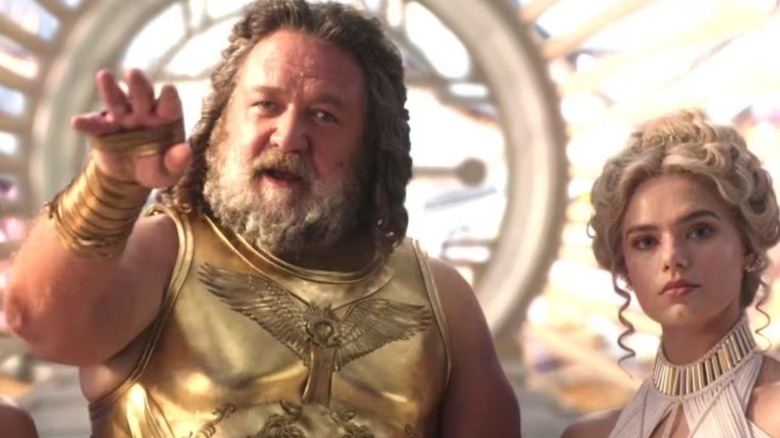
There's so much to love about how Taika Waititi and Jennifer Kaytin Robinson wrote Zeus. Despite some Marvel fans crying out that Russell Crowe's depiction's depiction of the mythic god in "Thor: Love and Thunder" is insulting, it's worth looking at it through a social class lens. As in Greek mythology, Zeus is the god of all gods. Due to his unchallenged rank, he has slid into hedonism. Of course, this version of a god is shown overindulging in sex and food and doesn't match a stereotypical image of a "fit" superhero. This Zeus is not too far off from the Zeus found in Greek myths whose tendencies to indulge come before attending to godly matters. If you don't believe me, ask his wife, Hera, who once fought her unfaithful husband for having an affair with a cow.
"Thor: Love and Thunder" hysterically leans into Zeus' unwavering belief in himself while highlighting how those in power are afraid to take risks that might cost them their throne. While it might not seem like it on the surface, there's a lot of weight placed on that scene between Thor and Zeus. Crowe balances Zeus' cockiness and celestial privilege with just the right amount of insecurity needed to sell the audience on Gorr being a threat to the gods.
Worst: Valkyrie Never Finds Her Queen
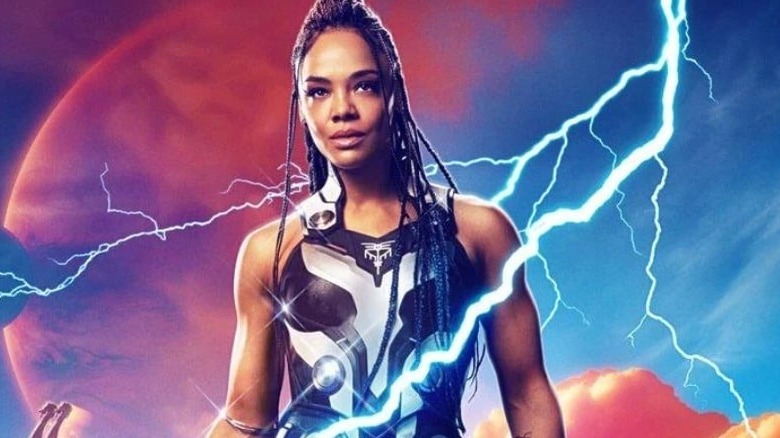
There are huge (and important) distinctions between suggesting a character is queer, coding a character as queer, and marketing a character as queer to up ticket sales from queer audiences but failing to deliver authentic queer representation (aka queerbaiting). Tragically, "Thor: Love and Thunder" falls into the last and most manipulative camp of the three homophobic options.
In 2019, Tessa Thompson promised that Valkyrie finds her queen in "Thor: Love and Thunder." In 2022, Natalie Portman called the film "so gay." Following the film's release, Taika Waititi told Out magazine, "We're all queer," and expressed his joy at pushing for LGBTQ representation on screen. But unlike Waititi's work in "Our Flag Means Death" and "What We Do in the Shadows," "Thor: Love and Thunder" never delivers Valkyrie's gay love story or dares to depict her sexuality.
Despite bringing Lady Sif back, whose actor previously said she'd love to be Valkyrie's queen, "Thor: Love and Thunder" never begins that romance for Valkyrie. Korg remarks that Valkyrie has "countless dalliances," but we don't get a montage of sexual partners leaving the King's chamber (as we did with Star-Lord in "Guardians of the Galaxy"). Instead, we get a PG-rated hand-kiss from Valkyrie to Zeus' maiden, a sanitized expression that is not representative of the joyful queerdom that Marvel Studios could have embraced under Waititi's direction.
Best: Hercules Will Be... Roy Kent?!?
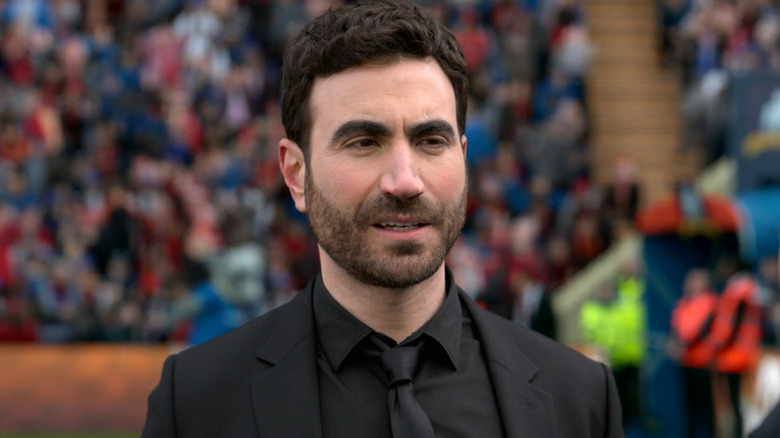
Imagining a crossover between "Ted Lasso" and the next Thor film is my new favorite hobby.
Of course, this was brought on by the mid-credits scene of "Thor: Love and Thunder." The ending footage shows a dejected Zeus beckoning to his son Hercules. He asks the god to fight Thor to bring honor back to the pantheon. The camera then pans to Brett Goldstein, known to "Ted Lasso" fans as Roy Kent, dressed as Hercules. He agrees to avenge his dear old dad. I never expected to hear a Roy Kent chant in my movie house, but I guess the star truly is here, there, and everywhere. So far, director Taika Waititi has remained coy about what (if any) plans await this character in the Marvel Cinematic Universe.
Goldstein is known for his delightfully deadpan humor, on set and off. The star recently reacted to a fan theory that Roy Kent is a CGI character by seriously addressing the claim on Instagram while wearing an emoji face filter. The comedy-focused "Guardians of the Galaxy" and its sequel brought $1 billion globally for Marvel Studios. After that success, it seems likely that Marvel Studios recruited Goldstein to expand its future comedic roster.
Worst: Valkyries Don't Get To Be Valkyries
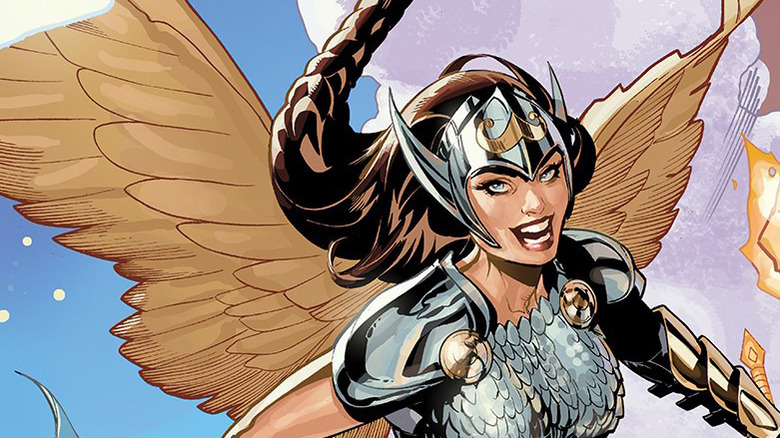
When Tessa Thompson's Valkyrie debuted in the Marvel Cinematic Universe, it made sense why her character abandoned her celestial duties as a warrior goddess. She chose to give up that calling, as she was still grieving the death of her teammates and girlfriend. By the end of "Thor: Ragnarok," Valkyrie decides to fight for Asgard. However, the story never veers back to what became of her afterlife duties. Sadly, neither does "Thor: Love and Thunder," even though it could have created a beautiful scene for Jane and Valkyrie.
In Marvel's comics, Valkyries not only protect the gods — often from each other — but they are also ferrymen for the dead, bringing whoever they deem worthy to the gates of Valhalla. The MCU films often make note of Valhalla, and even show it in "Thor: Love and Thunder," but don't address why the last-living Valkyrie isn't also helping the deceased. This film, like others, handwave that away by having gods disperse into magical gold flakes that find their way to Valhalla.
There's not much screen-time between Jane and Valkyrie in "Thor: Love and Thunder." The two fight alongside each other briefly and exchange jokes. "Thor: Love and Thunder" never gives Valkyrie the chance to say goodbye to Jane and ferrying her to Valhalla would have been an easy fix. Valkyrie could find closure, and the scene could have foreshadowed Jane's future fate as a Valkyrie.
Best: Thor Lends His Powers To New Asgardian Children And Their Stuffed Animals
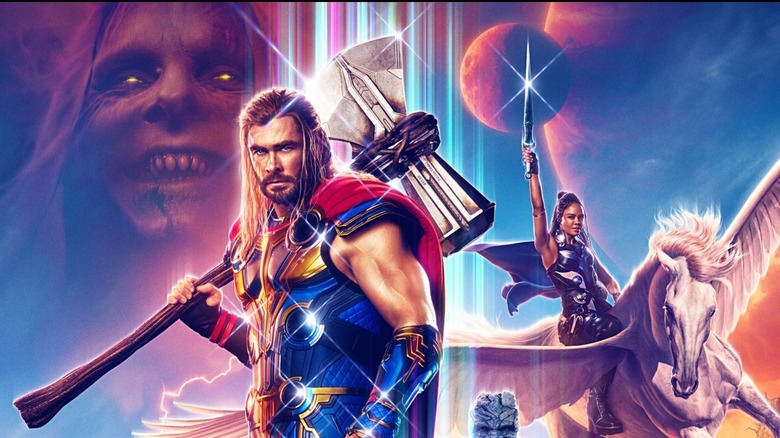
During the showdown with Gorr, Thor lends his God of Thunder powers "for a limited time only" to New Asgardian children to fight alongside him. The move feels akin to "Buffy the Vampire Slayer" Season 7 when Buffy, rightfully tired of fighting battles alone, recruited a generation of young slayers to join her. However, this film's take is a lot more lighthearted. Stuffed animals gain laser vision. A child in a ballet tutu delightfully spins around a shadow monster before slicing it in half with golden thunder power. Hands down, it's the most charming moment in "Thor: Love and Thunder."
Director Taika Waititi spoke to Marvel about how this sweet finale came about, sharing, "We want these kids to be in peril, and Thor has to save the kids. I think it felt like just a classic '80s movie." He wanted to steer away from "blow up the universe" stakes and move the film into something the audience could connect with more. To do this, Waititi recruited the cast and crew's children. Additionally, the children helped design each of the film's shadow monsters. "I was like, 'Get your kids to draw some monsters,'" Waititi said. "Then we just had a collection of monsters. So all of those monsters that Gorr summons, the reason they look so crazy is that they're all designed by children."
Worst: Why Mjolnir Calls Out To Jane
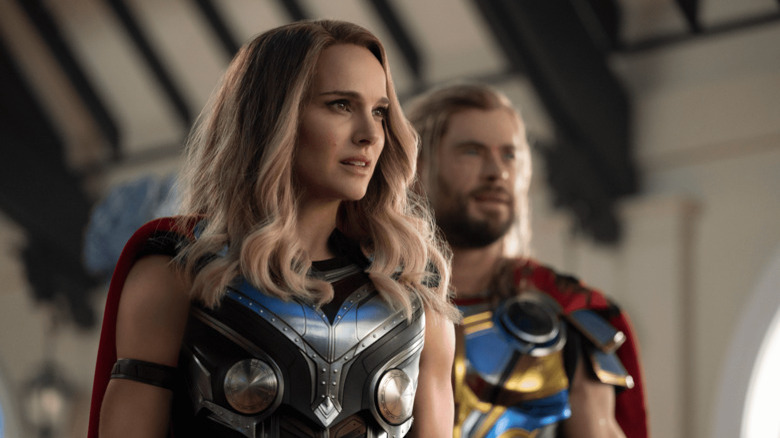
I was wary about how "Thor: Love and Thunder" would grant Dr. Jane Foster her powers as Mighty Thor. Ultimately, I'm not a fan of how the script handled her transformation. Despite its seemingly romantic setup, it's problematic how this transfer of power happens.
At first, I was charmed by the Thor and Jane rom-com montage that the film sneaks in to catch audiences up on what they were like as a couple and why they broke up. In this section of "Thor: Love and Thunder," Thor drunkenly asks Mjolnir to always look out for Jane. The hammer magically lights up as Korg, in voiceover, reveals that this action would have unintended consequences. Those are, of course, that when Jane's cancer advances to stage four, Mjolnir will call out to her. Unfortunately, this takes some of the story's empowering potential away. Even on the verge of death, Jane spent tireless days in her lab to advance modern medicine and physics. She doesn't need to have her boyfriend enchant Mjolnir to make her "worthy." She is worthy enough. If Captain America doesn't need a magic spell to pick up the hammer, neither does she.
Best: Dr. Jane Foster Arrives At Valhalla
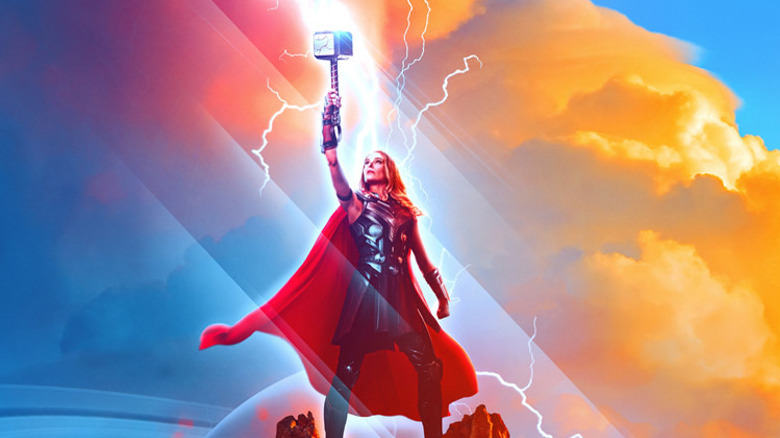
As soon as "Thor: Love and Thunder" fans left the theater, they started theorizing about what the post-credits scene means for Jane Foster's future. The movie ends with a scene of Jane greeted by Heimdall (Idris Elba) at the gates of Valhalla. The Asgardian thanks her for saving his son and tells her that she can come into the heavens. Although Jane smiles, we don't see her step forward. This might seem like a small detail, but it's an essential one.
In the comics, Jane technically dies but is resurrected by Thor and Odin. When she returns to life, her All-Weapon hears how sorrowful she is that all the Valkyries died (during Marvel's "War of the Realms" event). The All-Weapon (yes, it truly can think for itself, similar to how Taika Waititi depicted spitefully playful and willful Asgardian weapons) then decides to harness the power of all prior Valkyries and transform Jane into one.
As the MCU currently stands, this plotline wouldn't work. Odin is dead, and Thor doesn't show interest in reviving Jane. He's committed to being a dad to Love (India Rose Hemsworth) now. Jane's hesitance to enter Valhalla teases the possibility that her life as a Valkyrie might become part of the MCU should Natalie Portman decide to continue her character's story.
Read this next: 11 Marvel Comics Villains We Really Want To See In The MCU
The post The Best and Worst Moments in Thor: Love and Thunder appeared first on /Film.
